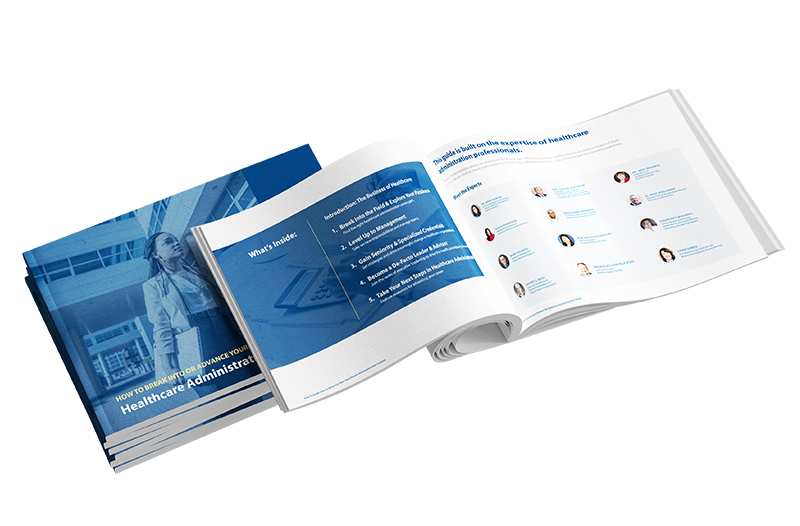Request Information
We're Sorry
There was an unexpected error with the form (your web browser was unable to retrieve some required data from our servers). This kind of error may occur if you have temporarily lost your internet connection. If you're able to verify that your internet connection is stable and the error persists, the Franklin University Help Desk is available to assist you at helpdesk@franklin.edu, 614.947.6682 (local), or 1.866.435.7006 (toll free).
Just a moment while we process your submission.

Healthcare Administration Salary: What You Need to Know
Health administration professionals are responsible for managing the daily activities of healthcare organizations and facilities, ensuring they meet the demands of patient care, compliance and healthcare standards.
The salary for healthcare administrators can vary significantly depending on several factors, including geographic location, experience level and educational background. Knowing these variables can help those entering the field or looking to advance their careers set realistic expectations for salary and career growth.
Average Salaries for Healthcare Administrators
The average salary for healthcare administrators is competitive, reflecting the important nature of the role and the demand for professionals who can manage the complexities of healthcare systems.
According to labor statistics from Lightcast, the median advertised earnings for healthcare administrators holding a bachelor’s degree in the United States as of August 2024 is approximately $75,100 per year.
This figure provides a general benchmark, but the actual salary for individuals in this field can vary widely based on a number of other factors, such as geographic location, demand, experience and level of education.
.png)
Advance your career in Healthcare Administration while you advance patient care. Download your free career guide.
Impact of Experience and Education on Salary
Experience and education are two of the most significant factors that influence the salary of health services managers.
Those just starting in the field, often with a bachelor's degree in healthcare administration, can expect to earn lower salaries compared to their more experienced counterparts.
For example, according to PayScale, an entry-level healthcare administrator in the United States with less than one year of experience can expect to earn an average total compensation of $64,494 a year. In contrast, a health administration professional with over 10 years of experience averages about $90,567 annually.
Dr. Leslie Mathew, chair of the Master of Healthcare Administration and MBA-Healthcare programs at Franklin University, reminds students that continuing their education can be a factor that leads to a higher salary.
“A master's degree or certifications generally lead to better compensation, while experience in leadership roles also increases earning potential.”
This includes certifications, such as the Certified Medical Manager (CMM), which can significantly enhance earning potential, particularly for professionals seeking to advance into more specialized or executive roles.
Bonus Resource:Can You Get into Healthcare Administration with No Experience?
Healthcare Administration Specializations
Specialization within healthcare administration can further increase salary potential.
Dr. Mathew explains, “Healthcare administrators in specialized fields often command higher salaries compared to general roles, as these positions require more targeted knowledge and expertise.”
For example, administrators working in mental health services, geriatrics, group medical practices or other specialized healthcare services tend to earn higher median annual wages due to the complexity of managing specialized facilities and the growing demand for these services.
This reflects not only the complexity of these fields but also the increased demand for administrative professionals in the healthcare industry who can navigate the nuances of these areas effectively.
Salaries in Different Healthcare Settings
Another factor that influences salary is the type of healthcare setting in which an administrator works, with the pay differences often reflecting the scale and complexity of the organization.
For example, May 2023 stats from the U.S. Bureau of Labor Statistics (BLS) suggest that U.S. healthcare administrators employed in large hospital systems tend to earn a higher mean annual wage ($145,390) than those in smaller settings, such as nursing care facilities ($106,520).
Hospitals require administrators to oversee large teams, manage complex budgets and ensure compliance with numerous regulations, which justifies the higher compensation for these roles.
On the other hand, administrators in smaller settings may have a narrower scope of responsibilities, but they still play an important role in ensuring the smooth operation of the facility. Home healthcare ($109,300), physician offices ($134,330) and outpatient care centers ($129,500) also offer competitive mean annual wages in the United States. However, they are generally on the lower end of the spectrum compared to large hospitals.
Salary Variations by Geographic Location
Dr. Mathew points out that “geographic location matters as salaries tend to be higher in regions with higher costs of living or where the demand for healthcare services is greater.”
Urban settings typically offer higher salaries than rural ones, given the larger scale of healthcare facilities and the greater need for administrative leadership in densely populated areas.
For example, according to Lightcast, states like California, Texas and Florida tend to offer higher salaries for healthcare administrators due to higher job demand. The higher cost of living and large health care systems in these areas also encourage more substantial salaries.
In contrast, salaries in more rural regions or states with a lower cost of living tend to be less. It should be noted, however, that these differences are often offset by the reduced cost of living in those areas.
.png)
Health Services Managers/Administration: Maximizing Your Salary Potential
Education and Certifications
One of the most effective ways to maximize earning potential in health services management positions is through continued education.
Earning a bachelor's degree in healthcare administration provides the foundational knowledge, skills and tools required to succeed in areas such as healthcare informatics, operations management, quality management, community health and leadership. Further education, such as a master's degree or certifications, can lead to even higher salaries.
Dr. Mathew emphasizes that “Certifications such as the Certified Healthcare Executive (CHE), Certified Medical Manager (CMM) and Certified Professional in Healthcare Quality (CPHQ) are particularly valuable assets that can boost a healthcare administrator's salary. Specializing in areas like health informatics, financial management or compliance can also lead to higher-paying roles due to the specialized expertise required.”
Negotiating Salary and Benefits
When entering a new healthcare administrator role or discussing raises, it's important to research industry salary data and come prepared with evidence of one’s value and contributions.
Dr. Mathew also notes that negotiating benefits is equally important and that understanding their full value can be a game-changer in evaluating overall compensation.
“Healthcare administrators often receive comprehensive benefits packages, including health insurance, retirement plans, and paid time off. Many organizations also offer professional development opportunities, tuition reimbursement and flexible work arrangements, enhancing job satisfaction and career growth potential beyond salary alone.”
.png)
Career Outlook and Job Security for Healthcare Services Administrators
According to projections from Lightcast, employment in healthcare administration in the United States is expected to increase by 14.6% through 2033, equating to approximately 3.77 million jobs.
Job stability in this field is also strong, as the need for healthcare services is unlikely to diminish in the coming years. This is advantageous for healthcare professionals seeking a stable, long-term healthcare administration career.
Your Next Step in Achieving a Lucrative Career in Healthcare Administration
Earning a bachelor's degree is an excellent first step toward achieving a professionally and financially rewarding career in healthcare.
To learn more about how to advance your career in healthcare administration, explore Franklin University's Bachelor's in Healthcare Administration program. Or, apply today and take the first step toward a fulfilling role in medical and health services.





